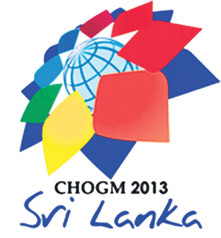
Profile of Commonwealth member countries
Compiled by Manjula Fernando
The origins of the Commonwealth lie in the former British Empire but
today it is an inter governmental organization of 53 nations (Gambia
withdrew early October 2013) which has equal status ‘regardless of size
or economic stature'. It means even the smallest country has a say in
shaping the Commonwealth Policy. The Commonwealth today comprises number
of States which has no shared history with the British Monarchy.
Thirty-two member countries of the Comonwealth are classified as small
States with a population of 1.5 million or less.
Following are brief profiles of member countries and their history to
the Commonwealth. This week's article is the fourth in the series,
features 13 States who became members of the Commonwealth between 1968
to 1978.
The Commonwealth Heads of Government Meeting (CHOGM) 2013 and its
side events will be held from November 10 to 17 in selected venues in
Colombo, Galle and Hambantota.
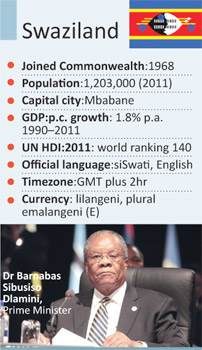 |
Swaziland
The Kingdom of Swaziland is a small landlocked country
in the east of Southern Africa, bounded to the east by Mozambique. The
country comprises four regions: Hhohho, Manzini, Lubombo and Shiselweni.
It is one of seven landlocked Commonwealth countries.
Swaziland is a member of the African, Caribbean and
Pacific Group of States, African Union, Common Market for Eastern and
Southern Africa, NAM, UN and WTO among others.
The country has eight nature reserves inhabited by
indigenous species. Several of them such as black and white rhinoceros
are under threat elsewhere. Limited supplies of drinking water, and
depletion of wildlife populations by excessive hunting are among its
most significant environment issues.
|
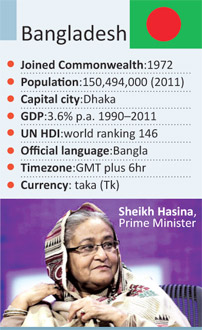 |
Bangladesh
The People’s Republic of Bangladesh is a fertile and
densely populated delta country in southern Asia bordered by the Bay of
Bengal, India and Myanmar.
Muhammad Yunus, Founder of the Grameen Bank in
Bangladesh, delivered the 6th Annual Commonwealth Lecture, on ‘Halving
Poverty by 2015’, in 2003; he was awarded the Nobel Peace Prize in 2006,
jointly with the Bank. Two Bangladeshi-born writers have won the
Commonwealth Writers’ Prize Best First Book award: Adib Khan (1995) and
Tahmima Anam (2008). Bangladesh is a member of the IOR-ARC, NAM,
Organisation of Islamic Cooperation, SAARC, UN and WTO.
Severe overpopulation, high risk of flooding and
ground water contaminated by naturally occurring arsenic are among its
most significant environment issues.,
|
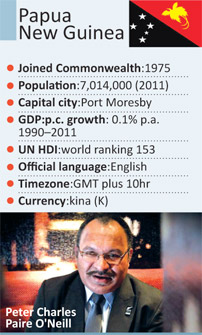 |
Papua New Guinea
The Independent State of Papua New Guinea in the South
Pacific shares a land-border with Indonesia.
Papua New Guinea includes the eastern half of the
world’s second biggest island, New Guinea. The rest of the country is
made up of about 600 small islands. Papua New Guinea has more than 800
indigenous languages, perhaps more than any other country has.
Papua New Guinea is a member of the African, Caribbean
and Pacific Group of States, Asia–Pacific Economic Cooperation, NAM,
Pacific Community, Pacific Islands Forum, UN and the WTO.
Papua New Guinea has many thousands of unusual species
of insect including the world’s largest butterfly, the Queen Alexandra
birdwing. Some 700 species of birds live there. The most significant
environmental issues include rainforest deforestation as a result of
growing commercial demand for tropical timber and severe drought.
|
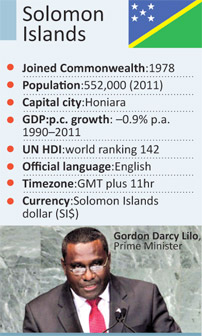 |
Solomon Islands
Solomon Islands, an archipelago in the south-west
Pacific, consists of a double chain of rocky islands and some small
coral islands.
Its nearest neighbour to the west is Papua New Guinea.
The country comprises the capital territory of Honiara and nine
provinces.
The Commonwealth Youth Programme Pacific Centre is
based in Honiara; it promotes youth development in 14 Pacific countries
with a total population of some 31 million.
Solomon Islands is a member of the African, Caribbean
and Pacific Group of States, Pacific Community, Pacific Islands Forum,
UN and WTO.
The most significant environmental issues are
deforestation and soil erosion. In addition much of the country's
surrounding coral reef is either dying or dead.
|
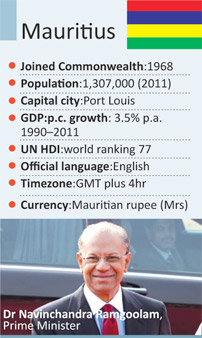 |
Mauritius
The Republic of Mauritius, an island country in the
Indian Ocean, lies east of Madagascar and the south-east African coast.
Its Constitution provides that Mauritius includes the islands of
Mauritius, Rodrigues, Agalega, Tromelin, Cargados Carajos and the Chagos
Archipelago, including Diego Garcia.
The 18th triennial Conference of Commonwealth
Education Ministers was held in Port Louis from 28–31 August 2012
Mauritius is a member of the African, Caribbean and
Pacific Group of States, African Union, Common Market for Eastern and
Southern Africa, Indian Ocean Rim Association for Regional Cooperation (IOR-ARC),
Non-Aligned Movement (NAM), Organisation internationale de la
Francophonie, Southern African Development Community, UN and WTO.
The island of Mauritius is almost entirely surrounded
by coral reefs, with lagoons and coral-sand beaches. Most significant
environment issues are water pollution and degradation of coral reefs.
|
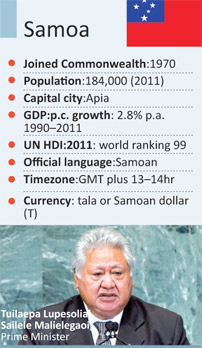 |
Samoa
Samoa means ’Sacred Centre of the Universe’. It is an
archipelago of nine islands at the centre of the south-west Pacific
island groups. Five of the islands are uninhabited.
Two Samoans have been regional winners in the
Commonwealth Writers’ Prize: Albert Wendt, born in Apia in 1939, won
with his novel, Ola, in 1992, and again with The Adventures of Vela in
2010; and Sia Figiel, born in Matautu Tai in 1967, won with her novel,
Where We Once Belonged, in 1997.
Samoa is a member of the African, Caribbean and
Pacific Group of States, Pacific Community, Pacific Islands Forum, UN
and WTO.
Animal life on the islands is restricted to several
species of bats and lizards, and 53 species of birds. The rare
tooth-billed pigeon on the island, thought to be a living link with
prehistoric tooth-billed birds. The most significant environmental issue
faced by the country is soil erosion.
|
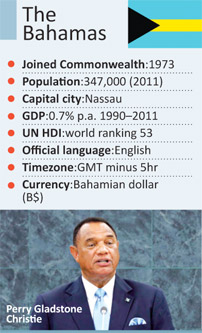 |
The Bahamas
The Commonwealth of the Bahamas is a coral archipelago
of around 700 islands and more than 2,000 rocks and cays in the West
Atlantic south-east of the coast of Florida. About 30 islands are
inhabited, the most important of which are New Providence.
Robert Antoni, born in The Bahamas in 1958, was winner
of the Commonwealth Writers’ Prize Best First Book award with his novel,
Divina Trace, in 1992. The Bahamas is a member of the African, Caribbean
and Pacific Group of States, Association of Caribbean States (ACS),
Caribbean Community (though not the CARICOM Single Market and Economy),
NAM, Organization of American States and United Nations.
Animal life is restricted to small species, such as
agouti, frogs, iguana and bats. The Inagua National Park on Great Inagua
Island is the home of more than 50,000 flamingos, the country's national
bird. Its the largest flock in the world. The most significant
environmental issues are coral reef decay and solid waste disposal.
|
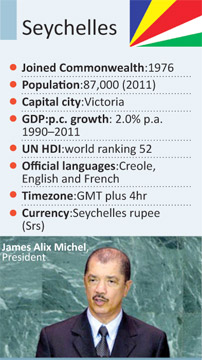 |
Seychelles
The Republic of Seychelles lies in the western part of
the Indian Ocean, north of Madagascar. It is an isolated archipelago of
outstanding natural beauty comprising about 115 islands, the largest and
most economically important of which is Mahé. It is built of mountainous
granite islands.
Seychelles has one of the highest incomes per capita
in Africa – US$11,130 in 2011.
Seychelles is a member of the African, Caribbean and
Pacific Group of States, African Union, Common Market for Eastern and
Southern Africa, IOR-ARC, NAM, Organisation internationale de la
Francophonie, Southern African Development Community and UN.
Some 89% of Seychelles is covered by forest, more than
any other country in the Commonwealth. There are many species of rare
birds. Four of its islands have been declared bird sanctuaries,
including Bird Island, which is inhabited by millions of fairy terns.
The most significant environmental issue is dependence on rainwater for
water supply.
|
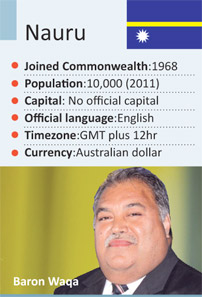 |
Nauru
Nauru is a small oval-shaped island in the western
Pacific Ocean. A sealed road 19km long circles the island.
With a population of about 10,000, Nauru and Tuvalu
are the smallest Commonwealth member countries. They are also two of the
world’s smallest democracies. Nauru is a member of the African,
Caribbean and Pacific Group of States, Pacific Community, Pacific
Islands Forum and United Nations. The most significant environmental
issues are devastation of some 90% of the island by intensive phosphate
mining and dependence on an ageing desalination plant for water supply.
|
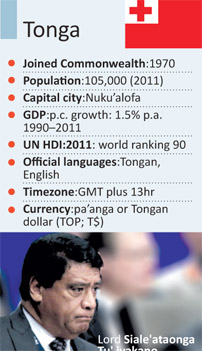 |
Tonga
The Kingdom of Tonga, known as ‘The Friendly Islands’,
lies in the central south-west Pacific. Its neighbours include Fiji and
New Zealand. The country comprises 172 islands (36 inhabited; some coral
and some volcanic) and straddles the international date line. Four of
the islands have active volcanoes. Tonga is a member of the African,
Caribbean and Pacific Group of States, Pacific Community, Pacific
Islands Forum, UN and WTO.
The most significant environmental issues are
deforestation, damage to coral reefs by excessive coral and shell
harvesting, and depletion of sea turtle populations by hunters.
|
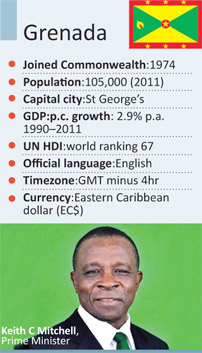 |
Grenada
Grenada consists of the island of Grenada, the most
southerly of the Windwards in the Eastern Caribbean, and some of the
southern Grenadine islands. Its Capital St. George's is a deep water
port.
Grenada is the world’s second largest producer of
nutmeg after Indonesia.
Grenada is a member of the African, Caribbean and
Pacific Group of States, ACS, Caribbean Community, NAM, Organisation of
Eastern Caribbean States, Organisation of American States, UN and WTO.
Wildlife comprises mainly smaller species such as mona
monkey and armadillo. The Grenada dove and endangered hook billed kite
are unique to the island.
|
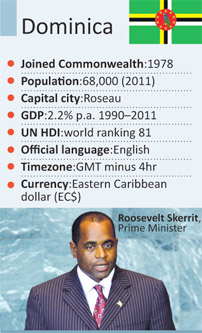 |
Dominica
The Commonwealth of Dominica is one of the Windward
Islands in the Eastern Caribbean. On his appointment in 2004 the current
prime minister, Roosevelt Skerrit, was the youngest head of government
in the world, aged 31.
Dominica is a member of the African, Caribbean and
Pacific Group of States, Association of Caribbean States, Caribbean
Community, NAM, UN and WTO.
A volcanic island 46km in length, Dominica has a
central mountain ridge running from Cape Melville in the north to the
cliffs in the south. The pollution of the coastal zone by chemicals used
in farming and factories and shortage of drinking water are some
environment issues faced by the country.
|
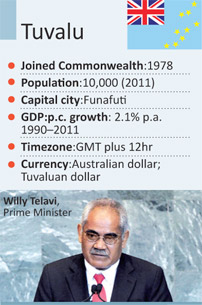 |
Tuvalu
Tuvalu, formerly the Ellice Islands, is a group of
atolls lying south of the equator in the western Pacific Ocean, north of
Fiji. With a population of about 10,000, Tuvalu and Nauru are the
smallest Commonwealth member nations and the world's smallest
democracies.
Tuvalu is a member of the African, Caribbean and
Pacific Group of States, Pacific Community, Pacific Islands Forum and
UN.
There are no streams or rivers in the country and
ground water is not safe to drink; water needs are met by catchment of
rainwater and, increasingly, by desalination. |
|
|
|

